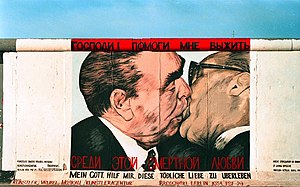社會主義兄弟之吻
社會主義兄弟之吻,又稱社會主義兄弟般的擁抱,是一部分馬列社會主義國家政治家之間的一種特殊問候方式。該行為據稱可以展現馬列社會主義國家間存在的「特殊聯繫」[1]。


「社會主義兄弟之吻」包含有一次擁抱和三次交替親吻雙頰[2]。在非常罕見的情況下,當兩位領導人認為雙方格外親近時,雙方會直接親吻對方的嘴而不親吻臉頰[3]。「社會主義兄弟般的擁抱」則包含連續三個深度擁抱,身體兩邊左右交替,不涉及親吻[4]。該問候方式主要為亞洲共產黨國家領導人所採用,因為亞洲沒有通過親吻臉頰表示問候的傳統。冷戰期間,亞洲共產黨領導人通常接受來自歐洲和古巴人的親吻,但自己之間則不進行親吻。
自從中東歐共產黨政權倒台以後,「社會主義兄弟之吻」已經不再流行。不過,「社會主義兄弟般的擁抱」則繼續在亞洲共產黨領導人間流行。此外,古巴也採用了亞洲模式[5][6]。
歷史
編輯該行為源自歐洲,家庭成員或朋友間會以親吻臉頰的方式表示問候。該行為也與東正教兄弟會或復活節之吻有關[3]。這一行為在東正教教堂的儀式中根深蒂固,表達能力很強,因此在日常生活中得到了應用。
作為平等、博愛和團結的象徵,「社會主義兄弟之吻」體現了19世紀中葉至末期新興工人運動的激情。十月革命後,隨著共產國際的建立,這一原本自發的行為逐漸演變成了一種儀式,成為了共產黨同志之間正式問候的方式。由於許多共產黨員和社會主義者當時前往地處偏遠的蘇俄,不得不要進行漫長、艱苦而危險的旅行,這種象徵著牢固友誼的行為也因此變得更加流行[來源請求]。
隨著第二次世界大戰後共產主義的擴張,蘇聯不再是唯一的共產主義國家。「社會主義兄弟之吻」成為共產黨國家領導人之間禮節性問候的方式。第三世界的社會主義領導人[7][8],巴勒斯坦解放組織和非洲人國民大會等有社會主義傾向的解放運動的領導人也都開始採用「兄弟之吻」或「兄弟般的擁抱」[9][10]。
蘇聯問題研究
編輯一些蘇聯問題研究專家會特別關注共產黨領導人之間是否互相擁抱。跳過這一常規會被視作雙方關係處於較低水平的象徵[11]。
例如,在中蘇交惡之後,中國人拒絕擁抱蘇聯同行,或拒絕稱蘇聯人為「同志」[12]。即使在1989年雙方關係正常化後,中國大陸領導人在問候蘇聯領導人時仍然跳過了「兄弟般的擁抱」。不過,中國大陸領導人在與其他共產黨國家的領導人會面時仍會互相擁抱[13]。這樣做是為了強調中蘇關係沒有恢復到中蘇分裂前1950年代的水平。中國大陸外交禮節中特別表示與蘇聯人「只握手,不擁抱」[14][4]。
由於其重要的象徵意義,即使存在有嚴重分歧,共產黨領導人通常仍會互相擁抱,以免給公眾造成關係緊張的印象。例如,雖然中國大陸和越南對南沙群島的主權存在異議,但是中國大陸和越南領導人仍會互相擁抱[4]。
親吻臉頰
編輯「社會主義兄弟之吻」不應與世界領導人之間通常的親吻臉頰相混淆。例如,法國總統傳統上也會通過親吻雙頰來問候世界各國領導人[15][16]。不過,這並不是「社會主義兄弟之吻」,原因是只親吻兩次,而且沒有意識形態的含義。戴高樂主義的總統和社會黨總統都採用這種做法。
流行文化
編輯「社會主義兄弟之吻」因東德領導人、德國統一社會黨總書記埃里希·昂納克和蘇聯領導人、蘇聯共產黨總書記列昂尼德·勃列日涅夫二人接吻的照片而知名,此後,它以塗鴉的形式在柏林圍牆出現,名為《我的上帝,助我在這致命之愛中存活》。
參考
編輯- ^ Photos: A History of Lip-Locking in Russia, Home of the "Socialist Fraternal Kiss". Vocativ. 2013-08-20 [2017-06-04]. (原始內容存檔於2017-04-28).
- ^ Smale, Alison. Romania Cool Toward Gorbachev's First Visit. Associated Press. 1987-05-25 [2019-10-21]. (原始內容存檔於2018-02-14).
Soviet leader Mikhail Gorbachev and President Nicolae Ceausescu, who has openly attacked recent Kremlin reforms, greeted each other warmly today as Gorbachev began his first visit to this maverick East bloc nation. The two leaders embraced and kissed each other three times on both cheeks.
- ^ 3.0 3.1 Belton, Padraig; Citron, Lana. The Politics of the Kiss. New Statesman. 2016-02-11 [2017-06-04]. (原始內容存檔於2017-07-17).
- ^ 4.0 4.1 4.2 Chinese Premier Li Keqiang begins Vietnam visit. Reuters. 2013-10-13 [2019-10-21]. (原始內容存檔於2017-04-05) –透過YouTube.
- ^ Chinese President Xi Jinping awarded Cuba's Jose Marti Medal. CCTV.com English. Xinhua. 2014-07-23 [2019-10-21]. (原始內容存檔於2017-02-02).
Chinese President Xi Jinping (L) hugs Cuban President Raul Castro after being awarded Cuba's Jose Marti Medal in Havana, capital of Cuba, July 22, 2014. (Xinhua/Ma Zhancheng)
- ^ Castro brothers' China complex. ChinaDaily.com.cn. Sina.com. 2014-07-23 [2019-10-21]. (原始內容存檔於2018-02-14).
Fidel Castro and then Chinese Premier Zhu Rongji hug each other on Castro's second visit to China on Feb 27,2003.
- ^ Russian President Podgorny Greeted by President Kaunda. AP Archive. 1977-03-27 [2019-10-23]. (原始內容存檔於2017-05-10).
- ^ Venezuelan president Hugo Chavez meets Chinese President Jiang Zemin. AP Archive. 2001-05-24 [2019-10-23]. (原始內容存檔於2017-04-04).
- ^ Anderson, Forrest. Yasser Arafat & Deng Xiaoping. Getty Images. 1989-10-05 [2019-10-23]. (原始內容存檔於2019-10-23).
Chmn. Deng Xiaoping, (L), embracing PLO Chmn. Yasser Arafat, during mtg. in Beijing, China.
- ^ Nelson, Mike. Muammar Gaddafi. Getty Images. 1990-05-18 [2019-10-23]. (原始內容存檔於2019-10-23).
South African anti-apartheid leader and African National Congress (ANC) member Nelson Mandela (l) and Libyan leader Moamer Kadhafi hug each other 18 May 1990 upon Mandela arrival to Tripoli.
- ^ Biers, Dan. Summit Stumper: Will Deng Hug Gorbachev?. Associated Press. 1989-05-15.
Will they or won't they? The big question when the tightly orchestrated Soviet-Chinese summit between Mikhail S. Gorbachev and Deng Xiaoping begins is whether the leaders will embrace to symbolically end 30 years of strained relations.
- ^ Biers, Dan. Summit Stumper: Will Deng Hug Gorbachev?. Associated Press. 1989-05-15.
When Soviet Foreign Minister Eduard Shevardnadze visited Deng in Shanghai last February he received a warm and lengthy handshake, but no hug. Schevardnadze referred to the Chinese leader as "comrade," but the socialist honorific was not returned.
- ^ National Technical Information Service. Daily Report: People's Republic of China. United States Foreign Broadcast Information Service. 1989, (20-29).
But the Chinese leader did not embrace Mr. Shevardnadze, as he usually does with visiting personalities from communist nations.
- ^ Radchenko, Sergey. Unwanted visionaries: the Soviet failure in Asia at the end of the Cold War. New York, NY: Oxford University Press. 2014: 166. ISBN 9780199938773.
The main question of protocol, mulled over by the media, was whether Deng would bear-hug Gorbachev or offer him a handshake. This came under careful scrutiny of policy makers at the highest level. "Embracing might shock the world," Deng said with an eye to the West's reaction. Therefore, the Chinese protocol specifically provided for "handshake, no embrace" to highlight the new character of Sino-Soviet relations.
- ^ YouTube上的Arrivée en France du président Hu Jintao
- ^ Sarkozy and Merkel inject new life into alliance. RFI English. Reuters. 2010-02-04 [2019-10-23]. (原始內容存檔於2018-12-14).
French President Nicolas Sarkozy and German Chancellor Angela Merkel kissing at the Elysee Palace in Paris on 4 February
外部連結
編輯- Schimmel, Claudia, Der ‚sozialistische Bruderkuß‘ [The ‚Socialist Fraternal Kiss『] (PDF, 128 kB), [2019-10-23], (原始內容存檔 (PDF)於2020-05-21) (德語)